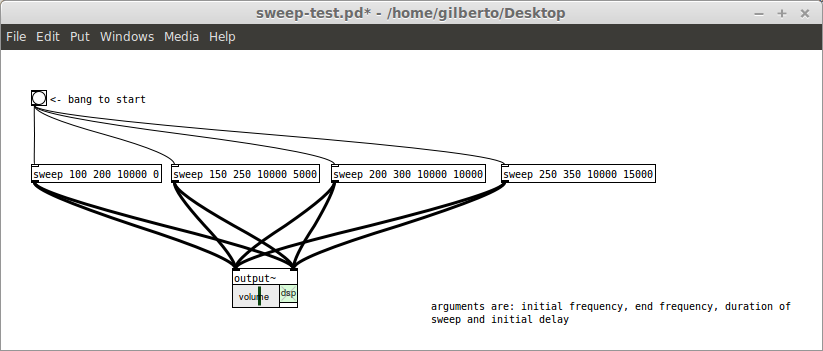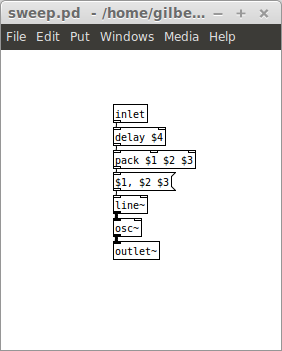hi all,
i'm a brooklyn-based composer who is completely new to the coding world, have never used pd, have never used max, etc. looking to do some VERY basic stuff -- essentially would like to build a simple patch with time-triggered, looping frequency sweeps of various dimensions that i can modify as needed to support some paper/acoustic-based experimentation i'm doing. i downloaded pd yesterday, and spent a few hours down the rabbit-hole, and think i would greatly benefit from an hour with a nyc-based expert who can walk me through some very basic technique and make sure all of my ins/outs are lined up elegantly. of course, happy to pay for the lesson. please dm me if you have an hour to spare this week and need some scratch!
-
private teacher?
-
...We can help you for free online, too haha. Could you post some YouTube links or something that demonstrates the sound you're going for?
-
that's super generous! in a nutshell, using totally generic data:
let's say i want to build three pitch sweeps, [a], [b], [c]. sine waves are fine. [a] goes (in a straight line) from 100-200Hz starting at 10000ms and ending at 20000ms. [b] goes from 150-250Hz starting at 15000ms and ending at 25000ms. and so forth with [c]. i'd like to have this three line pattern loop (untriggered) at regular intervals defined by me. i would love for all of these parameters to be modifiable: the starting/ending frequencies of [a,b,c], the starting/ending time parameters, the rate of loop occurrence.
later, i might want to add in a fourth line [d], or perhaps several more, without needing to redesign the patch.
i know this is embarrassingly preschool level stuff, but when i say i'm completely new to the world of pd/max, i mean i literally learned what an "object" is last night. (hence the 1-on-1 i'd love to set up!)
if you're in the nyc area, or have a half hour to spare with remote desktop, i'd love a hand with this, and would be glad to paypal you some date money.
-
Hi dakota, and welcome to this forum,
If you are a complete beginner in Pd, I would suggest you try reading about some basics before trying to get things done. An excellent book for complete beginners is Kreidler's Loadbang, available for free online at: http://pd-tutorial.com/ (it also can be purchasable as a hardcopy). Some concepts such as order of operations, hot and cold inlets, subpatches and abstraction, arguments, and also familiarization with basic objects ([metro], [delay], [dac~], etc.), are fundamental to be able to program well in Pd. That book covers it all without ever getting too technical, and it's what I always recommend to complete beginners.
But as for your sweep problem above, I created this for you:

which uses the following abstraction:

I can try help you understand these patches, but if you just learned what an object is then I think you have to learn some basics before this.
Cheers,
Gilberto -
This is how i'd do it. I didn't write the audio part, just the frequency control. So you have an abstraction called [sweep], and you have to give it an argument. You can use as much of these as you want ( so [sweep 1], [sweep 2]; [sweep 3] etc.). You then just have to send the following information to each one : startx (x being your creation argument, so start1 will be sent to sweep 1).
If you want sweep 1 to start after 10000ms, just write [; start1 10000(. Same thing for the other parameters : endx, startfreqx, and endfreqx. -
wow, you guys... have to say i'm completely blown away by everyone's generosity and community spirit! thanks so so much to everyone who's taken the time to write (much less actually build their solutions!!!)
brand new to abstractions, but conceptually i understand what is going on. gilberto, thanks for pointing me to loadbang. (there's a ny-based new music ensemble with that name; i now get that haha.)
anyhow, i will read the material, start experimenting, and round back in. essentially, i've been building some conceptual models on paper that deal with pitch space and require microtonality and more hands than i have the ability to personally render on a standard keyboard. this calculator you are helping me to build will give me the opportunity to sketch out some proofs of concept in aural space, fail horribly, try again, get closer, re-work, etc. ad infinitum, before actually writing the material i plan to write. exciting stuff and very much appreciated.
more soon and thanks again to all.
-
gilberto, thanks for pointing me to loadbang. (there's a ny-based new music ensemble with that name; i now get that haha.)
My pleasure. Actually, [loadbang] is one of the very useful objects in Pd, which is where the name of the book (and very likely the ensemble) came from

anyhow, i will read the material, start experimenting, and round back in.
Good luck, and feel free to post questions in the forum if you need help.
Cheers,
Gilberto


